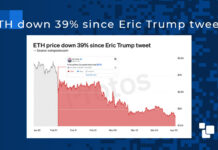More than $280 billion has been wiped from the “magnificent seven” tech stocks following the release of several earnings reports on Oct. 25, triggering fears of a looming tech recession.
The so-called “magnificent seven” refers to the top seven blue-chip tech firms including Apple, Microsoft, Meta, Amazon, Alphabet, Nvidia, and Tesla — who combine to make up a quarter of the value of the S&P 500 index.
Google parent company Alphabet saw its share price fall over 9%, wiping $180 billion from its market cap and was noted as Google’s worst-performing day since the COVID-19 pandemic hit in March 2020.

The share prices of Amazon, Nvidia, and Meta fell 5.5%, 4.3%, and 4.2% respectively, according to Y Charts.
Apple and Tesla’s fall in share prices were less severe at 1.35% and 1.9%, while Microsoft was the only one of the seven to buck the trend, with its share price rising 3.1% after reporting better-than-expected growth in its Azure business.
“This is the most widespread tech selloff in months which has resulted in a 5-month low for the S&P 500,” Kobeissi said.
“This is what happens when the few stocks that are holding up the entire market break,” the firm said, adding that tech stock investors may be beginning to price-in a recession.
“It seems like buyers are becoming more hesitant as headwinds accumulate,” Kobeissi noted in a follow-up response.
Fears of a “stock market crash” have also been reflected in Google search trends, with the three-word term up 233% over the last week, noted Andrew Lokenauth, a reporter for TheFinanceNewsletter.com.
On the other hand, the cryptocurrency market has been trending upwards amid optimism over possible spot Bitcoin ETF approvals in the United States, with market cap increasing 16.3% to $1.3 trillion over the last week, according to CoinGecko.
Bitcoin (BTC) Ether (ETH), Binance Coin (BNB) and XRP in particular have increased 23.3%, 16.7%, 8% and 15.2% respectively over the last seven days.
However, the crypto market hasn’t proven to be bulletproof in face of tough macroeconomic conditions.
When the United States real gross domestic product decreased over the first two quarters of 2022, the cryptocurrency market cap fell 61.7% from $2.37 trillion to $907 billion, according to CoinGecko.

While analysts speculate whether Bitcoin will decouple further from tech stocks and the S&P 500, past research from the Multidisciplinary Digital Publishing Institute suggests Bitcoin still tends to trade like a “tech stock” over the long term — due to its extreme volatility.
It can, however, serve as a viable hedge against the U.S. dollar, which it’s negatively correlated to, the research firm deduced from an Oct. 2022 report.
Since Sept. 1, Bitcoin has decoupled from the NASDAQ 100, increasing 34% while the NASDAQ has fallen 8.6% over the same time frame.
Meanwhile, the recent investor movements have some observers hinting that the movement could be seen as a “flight to safety” toward Bitcoin — particularly in light of several banking stocks plummeting lately.




